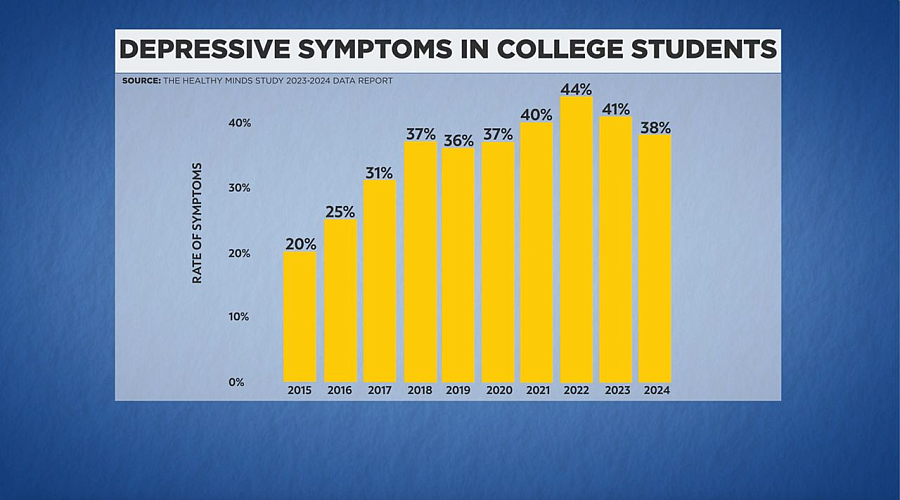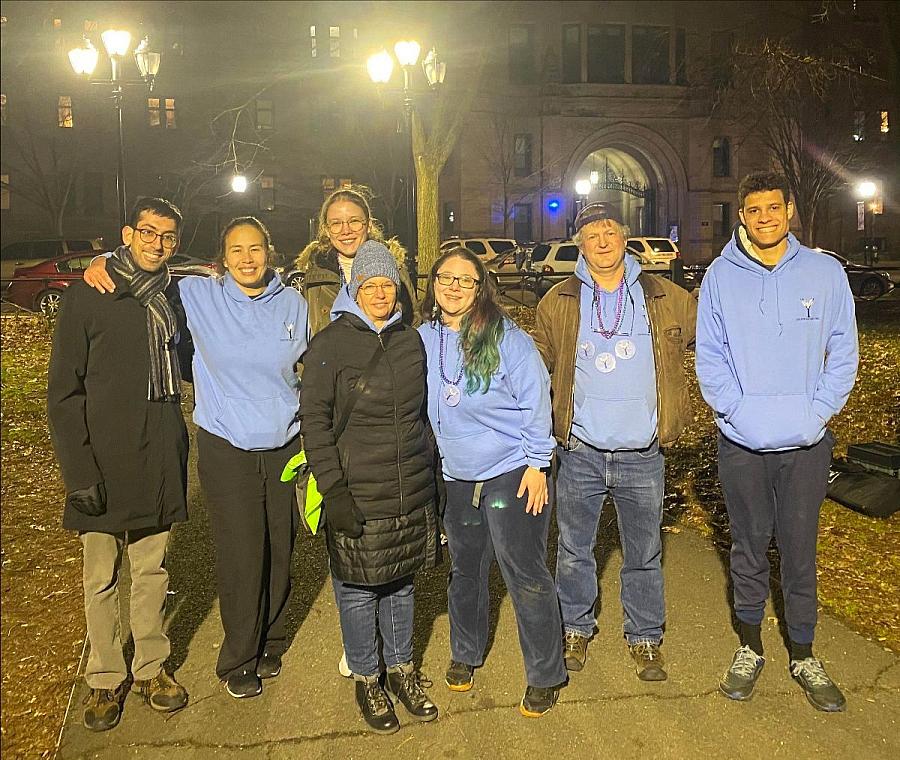Advocates and schools fight to end suicide on college campuses
The story was originally published by Spectrum News with support from our 2024 National Fellowship.
Rachael Shaw-Rosenbaum lost her mental health battle during her freshman year at Yale University. Her loved ones are fighting to end college suicide. (Zack Dugue)
If you or someone you know needs help, call or text 988 to reach the Suicide and Crisis Lifeline or live chat at https://988lifeline.org/
For many young adults, college is their first experience on their own. The new independence can be exciting, but it can also be isolating, especially for those with a history of mental health struggles. We look at how one young woman lost her own battle with mental illness and how those who loved her are fighting to prevent future tragedies.
What You Need To Know
- Data shows more than a third of college-aged students struggle with their mental health
- Advocates say supporting college students' mental health goes beyond just offering counseling services
- Changes like peer support programs and more supportive medical leave policies may help students who are struggling
Zack Dugue met Rachael Shaw-Rosenbaum at a scholarship weekend in March 2020.
He said there was a connection from the moment they met. “She was one of the most brilliant people I have ever spoken to in my entire life.”
“She was doing all the things she thought that she should be doing,” he said. “But she was put into this impossible situation.”
Both preparing to attend elite colleges, their schedules were packed. But when COVID cancelled their summer plans, they spent the time together.
“It was a very special summer,” Zack recalled.

Zack Dugue (left) and Rachael Shaw-Rosenbaum (right) spent the summer before college together.
(Zack Dugue)
Fall brought a return to real life. While Zack began his freshman year online at the California Institute of Technology (better known as Caltech), Rachael lived on Yale’s campus during the pandemic.
“It was very, very isolating,” Zack said of Rachael’s experience. “I mean, with all the Covid restrictions and stuff, she had a rough time.”
Dr. Jessi Gold, the chief Wellness officer for the University of Tennessee system, explains that even without a pandemic, college can be a challenging time for many students’ mental health.
“I think that college has always been a time of identity development,” she said.
“If you throw in experimentation with substances, being away from home, trying to make new friends, and loneliness and all of those brain changes, I think we see an increase in mental health conditions as a result,” explained Gold.
That was certainly true for Rachael. When they spoke, Zack said he could tell she was struggling.
He remembers her erratic sleep schedule, and nights when she could call him in a panic, worried about an assignment. “She talked about feeling suicidal,” he said.
Rachael sought support, even checking herself into the hospital for nine days.
“Her professors were pretty generous about like extensions and stuff,” said Zack. “Like, you know, they were understanding about that.”
She finished her first semester with good grades. But had to drop a class to catch up.
When she struggled again during her second semester, Rachael worried about what another hospital stay would mean for her education.
“The advisor said, you know, hey, if you had to go to the hospital again and you had to drop more than one class, like drop two classes or whatever, then you would be academically ineligible,” said Zack.
She also worried about the consequences of possible medical withdrawal. Under Yale’s policies at the time, a leave of absence may have meant she couldn’t return until the following spring.
“It is like you are temporarily de-studented, which for people in that position. Is a bit like dying,” Zack said.
For Rachael, it would also have meant losing her student health insurance—potentially limiting her access to mental health treatment
Faced with a difficult choice, Rachael chose to stay in school as her mental health declined. She died by suicide in March 2021.
Stories like Rachael’s have become too common among college-aged students.
“Over 13% of them have suicidal thoughts in the past year,” cited Gold.
Data from a Healthy Minds report shows more than a third display depressive symptoms. - a slight decline from its peak in 2022, but still almost twice what it was a decade ago.

Data from a Health Minds report shows an increase in rates of depression among college-aged students over the past decade
The numbers are clear, but what’s less clear is what may be behind the trend.
John MacPhee is CEO of the Jed Foundation – a non-profit that was founded in 2000 by another family who lost their college-aged son to suicide.
“Social media, life online, the opportunity cost of that means that people are spending less time face to face,” said MacPhee.
“We have climate change, war, racism, school shootings. There’s just a lot of as extensional threat and concern that young people are feeling.”
Gold argues the solution starts with prevention.
She advocates for policies that help students transition to college and get established with a therapist in advance. Gold also says peer support programs can be an important tool.
“You’re most likely to talk to a friend about suicidal thoughts or the way you’re feeling much earlier than you are to talk to someone like me. And so having built in trained peers who know how to deal with that.”
The JED Foundation works with schools to implement what they call a comprehensive approach to mental health and suicide prevention
“They should be doing things like developing life skills and coping skills of students helping to create a sense of belonging and fostering connectedness, reducing isolation, promoting help-seeking,” MacPhee said.
He points to data that shows their approach leads to positive results.
“The schools that have worked with the JED Foundation over four years see a 25% reduction in suicide attempts among students.”
Zack still finds it hard to speak about Rachael’s death. But the tragedy was also motivation.
He became a founding member of Elis for Rachael, a group dedicated to changing the school’s policies around mental health.

Zack co-founded Elis for Rachael to advocate for changes to Yale's mental health policies
(Zack Dugue)
In August of 2023, the group won a settlement against Yale, resulting in changes to the school’s policies. Among other changes, it’s now easier for students to take and return from medical leave. The new rules also allow students to remain on Yale’s health insurance while on leave.
In a statement, the school told us “Yale University offers a wide range of mental health services for Yale students,” citing the 2023 changes to leave policies as well as a variety of counseling and medication management services.
“I felt like the changes were such that, you know, if had they existed back then, I think Rachael would not have felt nearly the dilemma that she did,” Zack said.
Still, there are more changes he would like to see.
“We needed to push forward and keep fighting.”
A fight he takes on in honor of Rachael

